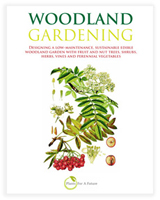Recommended this month

New Book ** Edible Perennials: 50 Top perennials from Plants For A Future [Paperback]
Current interest in forest or woodland garden designs reflects an awareness that permanent mixed plantings are inherently more sustainable than annual monocultures. They safeguard and enrich soil ecosystems, enable plants to form cooperative combinations, make use of layers above and below the soil, and they create benign microclimates which soften winds and recycle the rain. The challenge is productivity: how can yields of useful foods and other useful materials be maximised? The latest book from Plants For A Future is a resource for discovering some of the answers.
Edible Perennials provides detailed information, attractively presented, on 50 selected perennial plants, based on practical experience and observation, plus a wide range of reputable sources. All these plants yield edible produce: roots, tubers, seeds, oils, fruits, stems, flowers, or leaves, and many have other useful properties, which are also described. For each entry the descriptive text is augmented by summary information panels covering various attributes such as natural habitat, cultivation needs, nutritional value of edible parts, and potential uses within woodland garden designs. More >>
Plants For A Future: A resource and information centre for edible and otherwise useful plants
Plants For A Future (PFAF) is a charitable company, originally set up to support the work of Ken and Addy Fern on their experimental site in Cornwall, where they carried out research and provided information on edible and otherwise useful plants suitable for growing outdoors in a temperate climate. Over time they planted 1500 species of edible plants on 'The Field' in Cornwall, which was their base since 1989. Over ten years ago, Ken began compiling a database, which currently consists of approximately 7000 species of plants.
For more information on the work carried out by the Ferns, see: The History of Plants For A Future
For more on the Ferns see: The Ferns
Addy Fern says:
'Visits to the Field and volunteering there are welcome!'
Plants For A Future: 20 years on
The trustees of PFAF, in recognition of the work of the Ferns, and for information about what they achieved, commissioned a detailed mapping and ecological Survey of The Field. The Survey Report is available for anyone who is interested. We have also employed professional website developers to redesign the website and improve the content of the database, work on which is ongoing. We share in, and continue to support, the aims of the founders.
The Plants for a Future Concept
It is our belief that plants can provide people with the majority of their needs, in a way that cares for the planet's health. A wide range of plants can be grown to produce all our food needs and many other commodities, whilst also providing a diversity of habitats for our native flora and fauna.
There are over 20,000 species of edible plants in the world yet fewer than 20 species now provide 90% of our food. Large areas of land devoted to single crops increase dependence upon intervention of chemicals and intensive control methods with the added threat of chemical resistant insects and new diseases. The changing world climate greatly affecting cultivation indicates a greater diversity is needed.
more
New Book: Woodland Gardening
Designing a low-maintenance, sustainable edible woodland garden with fruit and nut trees, shrubs, herbs, vines and perennial vegetables

It is possible to plan out a woodland garden in a space as small as a backyard or as large as a few acres, using the guidelines that nature has shown us, but using species that can provide us with fruits, seeds, leaves, roots and flowers that are delicious and highly nutritious. When well designed, such a system can:
»» be far more productive than a field of annuals
»» produce a much wider range of foods
»» require far less work
»» require far less inputs such as fertilizers and pesticides
»» provide valuable habitats for wildlife
»» be very pleasing aesthetically....more